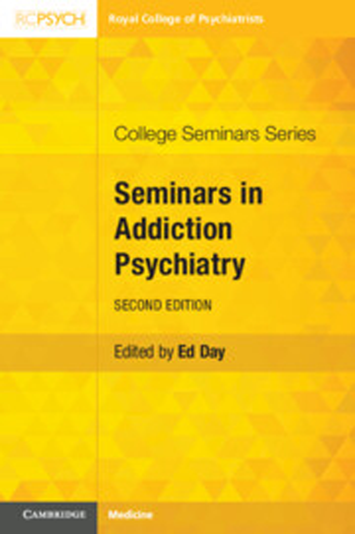
The second edition of Seminars in Addiction Psychiatry provides an excellent overview of the topic. It comes 27 years after the first edition and reflects many of the recent advances in the field, including the changes in DSM-5 and ICD-11 and major advances in the neurobiology of addiction.
Ed Day, the editor (and author/co-author of four chapters) explains in the preface how the original College Seminars Series was written by people applying textbook knowledge at the ‘coalface’ of clinical practice, and in the second edition he has attempted to maintain this balance of presenting the latest evidence while focusing on its application in policy and practice. Written in an accessible and readable style, the new edition closely follows the layout of the original, with revised and updated versions of the 11 chapters in the first edition written by new authors. There are four new chapters, on: tobacco use disorders; novel psychoactive substances and club drugs; addiction problems in a family and social context; and addiction recovery mutual aid organisations. The last of these brings a welcome North American perspective. NPS (novel psychoactive substances, previously ‘legal highs’) is a new kid on the block topic of general importance.
The first chapter follows the evolution of the concept of addiction and its associated terminology, including the development of the diagnostic labels ‘harmful use’ and ‘dependence’ and how they have been replaced by ‘alcohol use disorder’ in DSM-5.
As might be expected, there are comprehensive chapters on the epidemiology, aetiology, prevention and treatment of heroin, cocaine and alcohol dependence. There is also a chapter exploring the misuse of prescribed medications, including benzodiazepines and gabapentinoids. There are chapters looking at psychological approaches to treatment, policy responses to addictions in the UK and service provision.
In reviewing this book as a trainer in addiction psychiatry and an advanced trainee, it strikes us as an ideal source for supervision during an endorsement year, as well as a source for those studying for their RCPsych Membership exam. The chapter by Michael Kelleher and Luke Mitcheson on comorbid substance use and mental illness is a timely reminder that all working in general, forensic, old age, liaison and adolescent psychiatry need a working knowledge of these topics.
The book does not explore behavioural addictions such as gambling, but the editor suggests this will be tackled in the next edition, which, given the pace of change in this field, must surely arrive sooner than the nearly three decades we have waited for this updated edition.




eLetters
No eLetters have been published for this article.